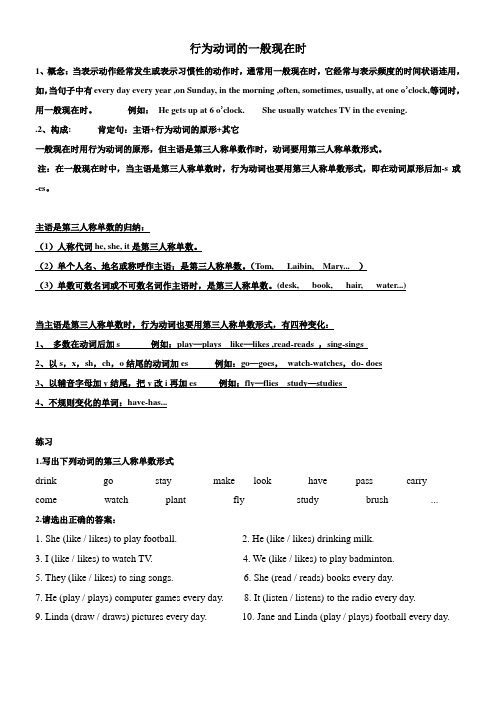行为动词(一般现在时)
行为动词一般现在时

行为动词一般现在时专练一、用括号内动词的适当形式填空。
1. He often_______ (have) dinner at home.2. Daniel and Tommy_______ (be) in Class One.3. We____________ (not watch) TV on Monday.4. Nick___________ (not go) to the zoo on Sunday.5. _______they (like) the World Cup?6. What ______they often _____(do) on Saturdays?7. ________your parents ________(read) newspapers every day?8. The girl_________ (teach) us English on Sundays.9. She and I _______(take) a walk together every evening.10. There______ (be) some water in the bottle.11. Mike______ (like) cooking.12. They_______ (have) the same hobby.13. My aunt_______ (look) after her baby carefully.14. You always______ (do) your homework well.15. I_______ (be) ill. I’m staying in bed.16. She______ (go) to school from Monday to Friday. 17. Liu Tao______ (do) not like PE.18. The child often_______ (watch) TV in the evening.19. Su Hai and Su Yang_______ (have) eight lessons this term.20. -What day_____ (be) it today?-It’s Saturday.二、按照要求改写句子1. Daniel watches TV every evening.(改为否定句)____________________________________________________________ 2. I do my homework every day.(改为一般疑问句,作否定回答)_____________________________________________________________ 3. She likes milk.(改为一般疑问句,作肯定回答)_____________________________________________________________ 4. Amy likes playing computer games.(改为一般疑问句,作否定回答) _____________________________________________________________ 5. We go to school every morning.(改为否定句)_____________________________________________________________ 6. He speaks English very well.(改为否定句)_____________________________________________________________ 7. I like taking photos in the park.(对划线部分提问)_____________________________________________________________8. John comes from Canada.(对划线部分提问)______________________________________________________________9. She is always a good student.(改为一般疑问句,作否定回答)_______________________________________________________________10. Simon and Daniel like going skating.(改为否定句)_______________________________________________________________三、改错( )1. Is your brother speak English?( )2. Does he likes going fishing?( )3. He likes play games after class.( )4. Mr. Wu teachs us English.( )5. She don’t do her homework on Sundays.一般现在时用法专练:一、写出下列动词的第三人称单数drink ________ go _______ stay ________ make ________ look _________ have_______ pass_______ carry ____ come________ watch______ plant_______ fly ________ study_______ brush________ do_________ teach_______。
初中英语行为动词一般现在时的整理

行为动词的一般现在时1、概念:当表示动作经常发生或表示习惯性的动作时,通常用一般现在时,它经常与表示频度的时间状语连用,如,当句子中有every day every year ,on Sunday, in the morning ,often, sometimes, usually, at one o’clock,等词时,用一般现在时。
例如:He gets up at 6 o’clock. She usually watches TV in the evening..2、构成: 肯定句:主语+行为动词的原形+其它一般现在时用行为动词的原形,但主语是第三人称单数作时,动词要用第三人称单数形式。
注:在一般现在时中,当主语是第三人称单数时,行为动词也要用第三人称单数形式,即在动词原形后加-s或-es。
主语是第三人称单数的归纳:(1)人称代词he, she, it是第三人称单数。
(2)单个人名、地名或称呼作主语;是第三人称单数。
(Tom, Laibin, Mary... )(3)单数可数名词或不可数名词作主语时,是第三人称单数。
(desk, book, hair, water...)当主语是第三人称单数时,行为动词也要用第三人称单数形式,有四种变化:1、多数在动词后加s例如:play—plays like—likes ,read-reads ,sing-sings2、以s,x,sh,ch,o结尾的动词加es例如:go—goes,watch-watches,do- does3、以辅音字母加y结尾,把y改i再加es例如:fly—flies study—studies4、不规则变化的单词:have-has...练习1.写出下列动词的第三人称单数形式drink ________ go _______ stay _______ make ___look ______ have_____ pass______ carry ______ come_________ watch_______ plant_________ fly __________study_________ brush________ ...2.请选出正确的答案:1. She (like / likes) to play football.2. He (like / likes) drinking milk.3. I (like / likes) to watch TV.4. We (like / likes) to play badminton.5. They (like / likes) to sing songs.6. She (read / reads) books every day.7. He (play / plays) computer games every day. 8. It (listen / listens) to the radio every day.9. Linda (draw / draws) pictures every day. 10. Jane and Linda (play / plays) football every day.行为动词的一般现在时1.肯定句:主语+行为动词的原形+其它当主语是第三人称单数时,行为动词也要用第三人称单数形式,2.否定句:主语+don’t( doesn’t ) +动词原形+其它如:①I like bread. 否定句:I don’t like bread. ②We eat fish . 否定句:We don’t eat fish. 当主语为第三人称单数时,要用doesn’t构成否定句。
一般现在时

练习
翻译句子: 1.我们周日去公园。
We go to the park on Sunday.
2.我不是很喜欢英语。
3.他们每年都来中国。
I don't like English very much.
4。他们不是每年都来中国。
They come to China every year.
They don't come to China every year.
• 4.Tom ___his homework at home. A don't do B doesn't C doesn't do D don't 5. My father ____computer games. A sometimes play B plays sometimes C sometime play D sometimes plays 6. His grandpa likes the film and often___to the cinema. A go B goes C is going D to go 7. Do you ___have parties? -Yes.Every Saturday evening. A does B never C often D do
一般现在时的特殊疑问句(3) • How do I write my homework on the y name? • When does he use a computer? • 构成:特殊疑问词+一般疑问句语序
练习
1.你每年寄多少张明信片? How many postcards do you send every year?
• 三.单数第三人称行为动词一般现在时 的疑问形式是在句首加助动词does, 后面的谓语动词要用原形。 • 比较: • 肯定句:He gets up very early. • 疑问句:Does he get up very early? • 答语 :Yes,he does. • NO,he doesn't.
一般现在时实意动词

Her friends go shopping. Mary goes shopping.
Jane reads books. The students read books.
二. 哪些主语 是第三人称单
数
1.人称代词he, she, it是第三人称 单数.
1).He likes watching TV. 他喜欢看电视.
2).Beijing is in China. 北京在中 国.
3). Miss Wu often makes cakes.王叔叔经常做蛋糕.
3.单数可数名词或 “this/that/the + 单数可数名词”
作主语时,是第三人称单数. 如: 1).This girl plays football in school.
• 13. My father always __________(come) back(回来) from work very late.
• 14. The teacher is busy. He __________ (sleep睡觉) six hours a day.
• 15. Joan __________(sing唱歌) in the classroom every day. She often __________ (sing) there.
2).She has lunch at twelve. 他十二点吃午餐.
3). It looks like a cat. 它看起来象只猫.
2. 单个人名.地名或称呼作主语时, 是第三人称单数形式.如:
1).Han Mei watches TV with her mother.韩梅和她的母亲看电 视.
2.2.We like MaW the. don’ t like Moths.
一般现在时(使用常识)

一般现在时一般现在时基本用法介绍【No. 1】一般现在时的功能1、表示事物或人物的特征、状态。
如:The sky is blue.天空是蓝色的。
2、表示经常性或习惯性的动作。
如:I get up at six every day.我每天六点起床。
3、表示客观现实客观真理、科学事实、格言以及不受时间限制的客观存。
如:The earth goes around the sun.地球绕着太阳转。
一般现在时的构成1、 be动词:主语+be(am,is,are)+其它。
如:I am a boy.我是一个男孩。
2、行为动词:主语+(行为)动词(+其它)。
如:We study English.我们学习英语。
当主语为第三人称单数(he, she,it)时,要在动词后加"-s"或"-es"。
一般现在时的变化1、 be动词的变化(am,is,are)。
否定句:主语+ be + not +其它。
他不是工人。
一般疑问句:Be +主语+其它。
答语:-Yes. I am. / No, I'm not.特殊疑问句:疑问词+一般疑问句。
2、行为动词的变化。
否定句:主语+ don't( doesn't ) +动词原形(+其它)。
如:I don't like bread.当主语为第三人称单数时,要用doesn't构成否定句。
如:He doesn't often play.一般疑问句:Do( Does ) +主语+动词原形+其它。
答语:- Yes, I do. / No, I don't.当主语为第三人称单数时,要用does构成一般疑问句。
如:- Does she go to work by bike? 答语:- Yes, she does. / No, she doesn't.特殊疑问句:疑问词+一般疑问句。
一般现在时(行为动词或称实意动词)动词+s的变化规则1、一般情况下,直接加-s,2、以s. x. sh. ch. o结尾,加-es,3、以“辅音字母+y”结尾,变y为i, 再加-es,如:study-studies注意:1、表示单数的人名、地名、事物名,通常看做是第三人称单数。
动词时态规则

动词时态规则动词时态是指动词在不同时间点所表示的动作或状态的形式。
根据英语语法规则,动词时态分为以下几种:一般现在时、一般过去时、一般将来时、现在进行时、过去进行时、将来进行时、现在完成时、过去完成时、将来完成时、现在完成进行时、过去完成进行时、将来完成进行时等。
本文将介绍这些动词时态的规则以及其用法。
一、一般现在时 (Simple Present Tense)一般现在时表示经常发生或普遍存在的动作、状态或观点。
一般现在时的构成为:主语 + 动词原形。
1. 行为动词的一般现在时:a. 第三人称单数主语,动词要加-s或-es。
例如:He plays football every Sunday.(他每个星期天踢足球。
)b. 非第三人称单数主语,动词使用原形。
例如:I like to read books.(我喜欢读书。
)2. 非行为动词(状态动词)的一般现在时:非行为动词指表示状态,感官或存在等的动词。
在一般现在时中,它们保持不变。
例如:She feels happy when she sings.(她唱歌时感到非常快乐。
)二、一般过去时 (Simple Past Tense)一般过去时表示过去发生的具体动作、状态或习惯动作。
一般过去时的构成为:主语 + 动词过去式。
1. 行为动词的一般过去时:a. 所有人称主语,动词使用过去式。
例如:They watched a movie last night.(他们昨晚看了一部电影。
)b. 动词过去式为不规则动词的规则形式。
例如:She went to school yesterday.(她昨天去上学了。
)2. 非行为动词(状态动词)的一般过去时:非行为动词在一般过去时中,仍保持不变。
例如:I knew the answer to the question.(我知道问题的答案。
)三、一般将来时 (Simple Future Tense)一般将来时表示将要发生的动作、事件或存在的状态。
Module_5_行为动词的一般现在时

4. I go to school ______ 8 o’clock in the morning. A. at B. in C. on D. for
此题考查介词。在具体的钟点前 面要用介词at。 所以选 A。
5. We usually have a football match _____ Sunday. A. in B. on C. at D. to 在具体的某一天、某一天的上午、 下午、晚上或星期几前要用介词on。 所以选 B。
go on weekdays, 7. I ___(go) to school ___ but not ___ on Saturday and Sunday. go 8. They ___(go) to the playground and play ____(play) football, but I _________(not like) football. don ’t like 9. We ____(have) meat and rice with have vegetables, or hamburgers.
3. I like hamburgers ____ some meat in them every morning. A. have B. for C. with with 表示“具有、带有”,另外还有 “加上,包括……在内” 的意思。如: China is a beautiful country with a long history. 中国是一个有着悠久历史的美丽的国家。
6. — What time do you usually have your first class? — ______ eight o’clock _____ the morning. A. At, on B. At, in C. On, in
行为动词的一般现在时

使用一般现在时可以表示与目前情况相反的情况,例如 “If only I were a rich man!”(我要是富翁就好了!)
与未来事实相反
使用一般现在时可以表示对未来的假设或期望,例如“If only I could fly!”(我要是能飞就好了!)
06
行为动词的一般现在时与过去时的 比较
在句尾添加问号(?)
在一般现在时的疑问句中,需要 在句尾添加问号(?)来表示疑
问语气。
问号的位置是在句子的最后一个 单词后面,而不是在句末逗号后
面。
例如:“He plays the guitar.” 变为疑问句为:“He plays the
guitar?”(他弹吉他吗?)
使用倒装句式
在一般现在时的疑问 句中,还可以使用倒 装句式来强调主语或 行为动词。
行为动词的一般现在时的疑问句形 式
将助动词do/does/did提前到句首
助动词do/does/did用于一般现在时的疑问 句中,表示询问对方是否执行某个行为。
助动词do/does/did放在句首,后面紧跟主 语和行为动词。
例如:“Do you play the guitar?”(你弹吉 他吗?)
03
行为动词的一般现在时的否定形式
在动词前加助动词do/does(第三人称单数)
总结词
在一般现在时中,当主语是第三人称单数时,否定形式在动词前加助动词 "does",其余人称在动词前加助动词"do"。
详细描述
例如,"He doesn't like apples."(他不喜欢苹果)和"They don't go to school on Sundays."(他们周日不去上学)中的"doesn't"和"don't"即为否定 形式的助动词。
- 1、下载文档前请自行甄别文档内容的完整性,平台不提供额外的编辑、内容补充、找答案等附加服务。
- 2、"仅部分预览"的文档,不可在线预览部分如存在完整性等问题,可反馈申请退款(可完整预览的文档不适用该条件!)。
- 3、如文档侵犯您的权益,请联系客服反馈,我们会尽快为您处理(人工客服工作时间:9:00-18:30)。
二、行为动词一般现在时的构成
行为动词一般现在时须用动词原形表示, 行为动词一般现在时须用动词原形表示,但当主 语是第三人称单数时,词尾须加es, 语是第三人称单数时,词尾须加-s或-es,其构成 方法与名词复数构成方法相同,现以动词work work为 方法与名词复数构成方法相同,现以动词work为 例: I You( You(你) He She It We You(你们) You(你们) They work. works.
finish — finishes teach — teaches watch — watches guess — guesses fix — fixes mix — mixes
再加-es: 3)以辅音字母加y结尾的动词变y 为i 再加-es: 以辅音字母加y结尾的动词变y carry — carries fly — flies plays的 之前是元音字母,只加- 但play — plays的y 之前是元音字母,只加-s。 es: 4)如词末为-o,-o前为辅音字母,加- es: 如词末为- ,-o前为辅音字母, go — goes do — does
将下列句子改为否定句和疑问句: 将下列句子改为否定句和疑问句:
1)They work in a factory. 2)Mary likes sports. 3)The boys go to school on foot. 4)His father and mother like watching TV. 5)She does her homework in the evening. 6)The students do morning exercises every day.
love 1)We ___________ (love) sports. sings 2)She ___________ (sing) well. 3)Tom and John ___________ (watch) TV every evening. watch goes 4)My son ___________ (go) to school by bike. 5)Their teacher usually ___________ (walk) to school. walks makes 6)Five plus two ___________ (make) seven. like 7)They all ___________ (like) him. falls 8)The sun ___________ (fall) in the west.
主语(第三人称单数) 动词原形…? 2)Does + 主语(第三人称单数)+ 动词原形 ? watches He watches TV every evening. Does he watch TV every evening? My father teaches Chinese. teaches Does your father teach Chinese? 简略回答用助动词do/does don’t/doesn t/doesn’t 简略回答用助动词do/does 和don t/doesn t 代替行为 动词. 动词. Do you often go shopping with your mother? do. don’t -Yes, I do. / -No, I don t. Does his mother work in that factory? does. doesn’t.(回答时须用人称代词 回答时须用人称代词) -Yes, she does. / -No, she doesn t.(回答时须用人称代词)
every
every other day (=every two days) every three hours once every two months
3)其他 the morning the afternoon the evening
in
twice a week
ห้องสมุดไป่ตู้
要点6 要点6 一般现在时的否定式
要点7 要点7 行为动词一般现在时的疑问式和回答
一般现在时的疑问式在句首加助动词do, 一般现在时的疑问式在句首加助动词do, 主语 为第三人称单数时在句首加does,其结构是: does,其结构是 为第三人称单数时在句首加does,其结构是: 主语+ 动词原形…? 1) Do + 主语+ 动词原形 ? They live near our school. Do they live near our school? The students like learning English. Do the students like learning English?
*区别do在以下句子中的不同功能 区别do在以下句子中的不同功能 do Do you do your lessons every day? don’t The students don t do their homework on Saturdays.
写出下列动词在句中的适当形式: 写出下列动词在句中的适当形式:
*如句中用了never(从不),hardly(很少、几乎 如句中用了never(从不),hardly(很少、 never ),hardly 等词来表示否定意义, 不)等词来表示否定意义,就不能再使用助动 don’t doesn’t 试比较: 词don t 或doesn t , 试比较: I don’t know you. don’t I hardly know you. don’t I don t hardly know you. (F)
一、什么是行为动词
行为动词指除动词be和have以外, 行为动词指除动词be和have以外,一切可以单独作 be 以外 谓语的动词。动词be和动词have一般表示状态, be和动词have一般表示状态 谓语的动词。动词be和动词have一般表示状态,而 行为动词大都用来表示动作, work,study, 行为动词大都用来表示动作,如work,study,swim 等。
四、行为动词一般现在时第三人称 单数形式的构成
行为动词一般现在时的第三人称单数形式的构成 方法和名词复数的构成方法完全一样。 方法和名词复数的构成方法完全一样。 1)一般在动词原形后加-s: 一般在动词原形后加- work — works run — runs live — lives
ch结尾的动词加 es: 结尾的动词加- 2)以s, x, sh, ch结尾的动词加-es:
一般现在时的否定式是在动词原形前加助 动词do ); 动词do not (don’t );主语是第三人称单数时在动 词原形前加助动词does (doesn’t) 其结构为: t), 词原形前加助动词does not (doesn t),其结构为: don’t+ 1)主语 + don t+ 动词原形 don’t They don t work here. don’t I don t go to school on Sundays. 主语(第三人称单数)+ doesn’t+ 2)主语(第三人称单数)+ doesn t+ 动词原形 doesn’t She doesn t like sports. doesn’t The boy doesn t study hard.
要点8 用作助动词的do与用作行为动词的do do与用作行为动词的 要点8 用作助动词的do与用作行为动词的do
在英语中,do既是一个助动词, 在英语中,do既是一个助动词,又是一个行 既是一个助动词 为动词。 为动词。 用作行为动词一般表示“ 1)do 用作行为动词一般表示“做”、“干”等意 思, We do morning exercises every day. Jack often does some washing on Sundays. She never does her homework in the evening. 2)do用作助动词主要用来帮助构成疑问句 用作助动词主要用来帮助构成疑问句、 2)do用作助动词主要用来帮助构成疑问句、否定 句或用于替代等。 句或用于替代等。 ?(帮助构成疑问句 帮助构成疑问句) Do you drive to work every day ?(帮助构成疑问句) doesn’t Sundays.(帮助构成否定句 帮助构成否定句) He doesn t work on Sundays.(帮助构成否定句) –
3)表示主语的特征、性格、能力等: 表示主语的特征、性格、能力等: She sings well. John and I love sports. We work hard. They all like me. 注意:英语中的人称代词有主格和宾格之分。 注意:英语中的人称代词有主格和宾格之分。主 格人称代词在句中作主语; 格人称代词在句中作主语;宾格人称代词作动词 或介词宾语。一般现在时还常用在下列句子中: 或介词宾语。一般现在时还常用在下列句子中: Here comes the bus. Here he comes. There goes the bell.
五、常与一般现在时搭配使用的 时间状语
1)表示时间频度的词语: 表示时间频度的词语: always usually often sometimes hardly never
2)与every一起用的状语词组: every一起用的状语词组: 一起用的状语词组 day week month spring year Monday
一般现在时用never 表示否定意义时, 一般现在时用never , hardly 表示否定意义时,如主 语为第三人称单数,行为动词要加es。试比较: 语为第三人称单数,行为动词要加-s 或-es。试比较: gets He never gets up early. gets He hardly gets up early. doesn’ He doesn’t get up early on Sundays. goes The girl hardly goes to school by bus. doesn’t The girl doesn t go to school by bus. 另外,为了加强否定意义可在否定句中加at 另外,为了加强否定意义可在否定句中加at all, 如 don’t all. I don t like the book at all.
